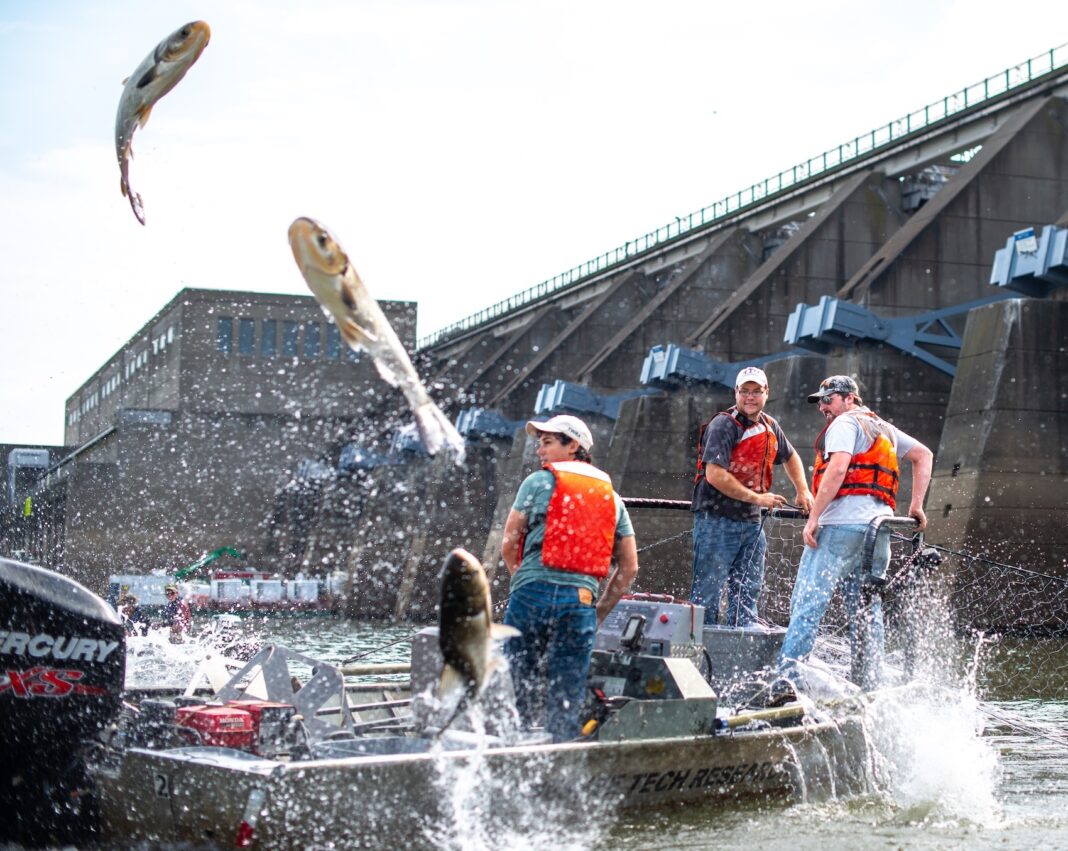Pictured above from left – students Josey Ridgway, Cole Harty and Zac Tankersley dodge jumping carp, an invasive species, at Barkley Dam in Kentucky.
Unit focuses on science for fish and wildlife resource management and conservation
Cookeville – Tennessee Tech University is celebrating 50 years of partnership with the Tennessee Cooperative Fishery Research Unit, which places federal scientists at universities to focus on research and education.
The Unit, started in 1972 and funded by the U.S. Geological Survey (USGS) in the U.S. Department of Interior, focuses on science for fish and wildlife resource management and conservation, while also training the next generation of aquatic biology professionals as graduate students and postdoctoral professionals.
Establishment of a USGS Cooperative Research Unit requires U.S. Congressional approval as well as Presidential funding approval, and Tennessee Tech is one of only 42 units across 40 states in the U.S.
“The university gets two non-salary faculty members who bring in graduate students and research funding, and the university and agency partners receive two dedicated scientists to do the science they need. Everybody wins,” said Amanda Rosenberger, Ph.D., professor of biology at Tech and assistant unit leader of the Tennessee Cooperative Fishery Research Unit.
She works with Mark Rogers, Ph.D, unit leader and professor of biology at Tech.
“As students are working on research projects, they are learning important skills in management of fisheries that they can then bring to their future jobs,” Rosenberger explained. “They learn quantitative techniques to assess and manage fisheries but also learn to ask important ecological questions. They learn how to go through the scientific process; even if they cannot ultimately answer those questions, they learn how to address them.”
Rosenberger works mainly in the field of conservation biology, which keeps her especially busy, as Tennessee and Alabama have the highest diversity of freshwater animals in this part of the world. Unfortunately, this also means there are many endangered species in this area as well, such as many species of freshwater mussels, which is Rosenberger’s primary focus.
“They filter water,” she said. “They convert what would be ‘junk’ in the water into biomass which is then usable by other creatures. Downstream of healthy mussel beds, you have clearer water and higher productivity of invertebrates. Where you have higher productivity of invertebrates, you also have more fish. More fish means more recreation, which means economic advantages, cleaner water, all sorts of things. These mussels are basically water filters supplied by a healthy river.”
Rogers and his students focus on reservoir sport fisheries management science and invasive species such as Asian carps in the Tennessee and Cumberland rivers. These invasive fish are not native to the waters of Tennessee. Rogers works with multiple state and federal partners to conduct monitoring and evaluate control methods to deter their damaging ecological effects.
Both Rogers and Rosenberger work with their students to conduct habitat and landscape analysis and conservation biology that focuses on discovering the most cost-effective actions that would most benefit the ecosystems in Tennessee’s freshwater lakes and rivers. The research provides information to policymakers to ensure they have the most complete knowledge possible before making decisions.
“I’m not an advocate. I’m an informer,” Rosenberger said. “I’ll go in and I’ll give you the information, but I won’t tell you where to go or what to do. Because, if we can’t maintain our reputation for impartiality, then what’s the point of our science? We’re very careful about that.”
Rogers continued.
“The Coop Unit has no regulatory authority; their role is to conduct objective and defensible science and share that with agencies and regulatory offices that make decisions informed by our results,” he said.
The Tennessee Unit over its duration has produced more than 100+ professionals who have entered the field of natural resource management in Tennessee and beyond. No matter what their students are researching, Rosenberger and Rogers also do their best to ensure that those studying under them are well-rounded fisheries biologists as well as specialists in their own field of study, teaching them a variety of skills that will be valuable no matter what profession they end up in after graduation.
They also work with postdoctoral researchers and post- M.S. research specialists, which elevates not only the caliber of research produced by Tennessee Tech but also provides important senior-level researchers for the natural resource management workforce.
One of Rosenberger’s research specialists, Kristin Womble, M.S., has been an asset to research on freshwater mussels in Tennessee while working through multiple projects. In working with this specialist, Rosenberger has been building Womble’s skill set that she may then take to any agency with whom she works in the future, whether at Tennessee Tech or with an outside employer.
“Every new project that we work on together, I make sure that there’s something new that she’s learning,” Rosenberger said. “So, if she does move on from Tennessee Tech, she’ll bring with her a great skill set that will be an asset to any agency that employs her. She is going to have a lot of options.”
Photo courtesy of Tech.









